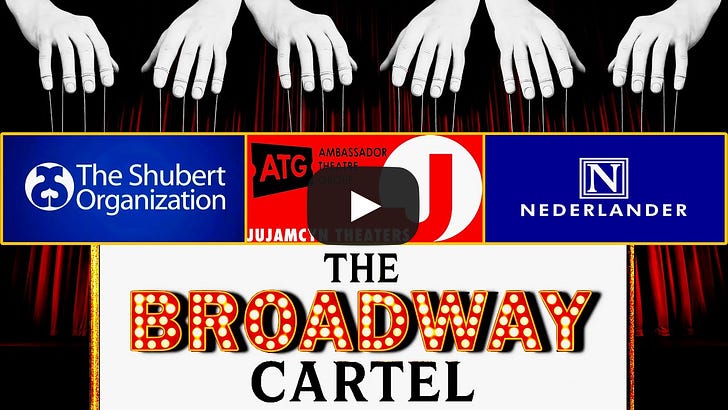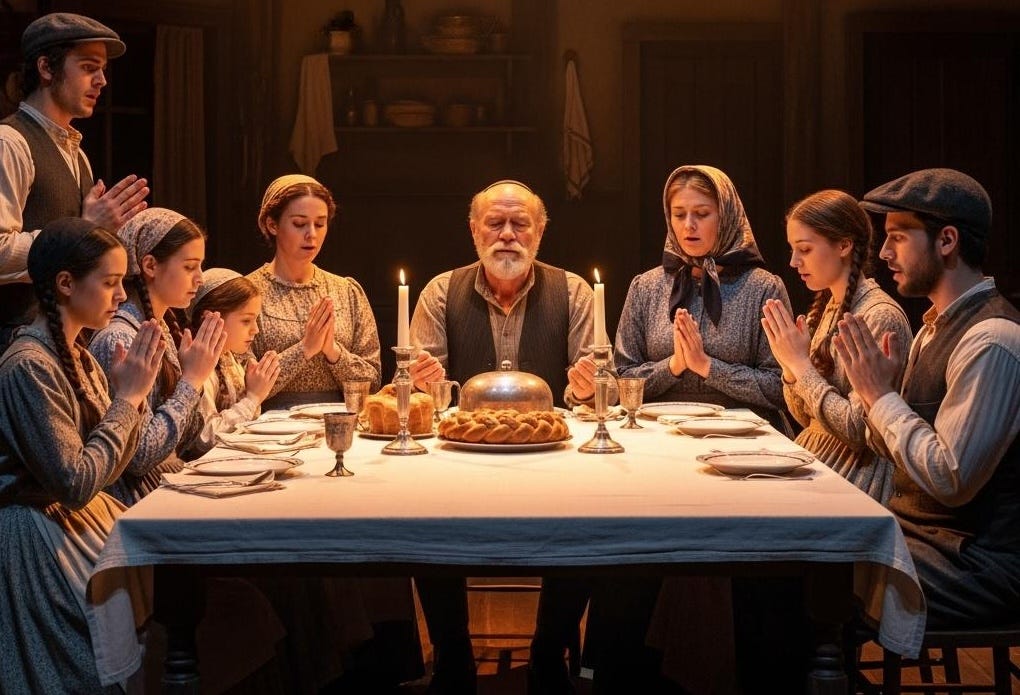"Sabbath Prayer" upends Fiddler's "Tradition"—not a blessing, but a warning
"Sabbath Prayer" upends Fiddler's "Tradition"—not a blessing, but a warningTevye and Golde plead "keep them from the stranger's ways" in vainJoin The Broadway Maven for a FREE engaging exploration of Chicago, the longest-running American musical in Broadway history. This one-hour online class will unpack the show’s sizzling music, biting satire, and unforgettable characters. We’ll trace its origins, examine Bob Fosse’s groundbreaking choreography, and discuss why audiences keep coming back for more of Roxie, Velma, and the razzle-dazzle. Date & Time: Monday, September 1, Noon and 7 pm ET Shalom, Broadway lovers!On this week’s marquee: A) an essay exploring the surprisingly important role the song “Sabbath Prayer” plays in Fiddler on the Roof; B) a Broadway Blast about Sunday in the Park with George; C) a StageStreams video about the economics of Broadway; D) a quiz about Broadway characters; and E) a Last Blast about Dear Evan Hansen. ESSAY: A mainstay of the Broadway canon, Fiddler on the Roof's score is of course deserving of praise, especially its first-act showstoppers. But nestled among the show's beloved "If I Were a Rich Man," "Sunrise, Sunset," and "To Life" is the quieter "Sabbath Prayer," often dismissed as a graceful but transitional number. That would be a mistake. "Sabbath Prayer" plays a key role in the show, setting up the structure and themes even more than the two numbers usually assumed to play that role, "Tradition" and "Matchmaker, Matchmaker." The former song presents the role every Anatevkan plays in the community, and the latter is an "I Want" song for Tzeitel, Hodel, and Chava. Granted, those functions matter, but "Sabbath Prayer" outlines the show's scaffolding—the triple blow Tevye will feel as his daughters choose husbands who increasingly deviate from tradition. The prayer’s first telling phrase comes early: “May He always shield you from shame.” In the quiet of the Sabbath table, the phrase sounds out of place. Why invoke shame on a night meant for peace and blessing? Unless Tevye and Golde are already aware that stepping outside Anatevka’s marital script risks disgrace. That fear materializes first with Tzeitel. When she rejects the matchmaker’s plan for her to marry Lazar Wolf, she doesn’t just upend Yente’s arrangement—she risks humiliating her parents in front of the community. The town knows Lazar is wealthy and willing; they will also know he’s been refused. What begins in “Sabbath Prayer” as a polite plea against shame becomes, in Tzeitel’s story, a confrontation with it, played out in public and at the expense of the matchmaking system that has kept Anatevka’s families “respectable.” "Sabbath Prayer" also foreshadows Hodel's story. Later in the prayer comes the line: “May He send you husbands who will care for you.” The verb matters—send. Tevye doesn’t ask that he himself find or approve these husbands; he leaves the choice, and the responsibility, to God. With Hodel, that abdication is already shaping her future. Perchik has just arrived in Anatevka outside the matchmaking network, and Hodel will soon accept his proposal without asking her father’s permission. She tells Tevye only afterward, her eyes fixed on joining Perchik in exile. In bypassing parental approval, she unravels another strand of the village’s marital fabric. The lyric’s shift in agency—from father to Heaven—quietly anticipates the moment when Tevye and Golde must face that their daughter’s husband is not theirs to choose at all. Tevye and Golde also sing:
On the surface, it sounds like a standard blessing, invoking the Tanakh. But here’s the key: lyricist Sheldon Harnick invented this part of "Sabbath Prayer" himself. The traditional Friday night blessing names the matriarchs, not Ruth and Esther. The pair are both heroines whose stories turn on marrying outside their own people—one a Moabite convert to Judaism, one a Jew who weds a Persian king. To invoke them is to brush against the very boundary Chava will cross. That's why "stranger's ways" is such a key phrase. Tevye and Golde, having watched their older daughters progressively violate communal norms, surely feared what might come next. With the gentle ballet "Chavaleh," Tevye will try, so to speak, to scratch out a pleasant, simple tune without breaking his neck. It’s a man facing the heartbreak he already imagined—and tried, through tradition and prayer, to prevent. So sure, enjoy the reverse curtain call of "Tradition"; the triple "I Want" song in "Matchmaker, Matchmaker"; and our main character's dreams in "If I Were a Rich Man." They set the scene. But to really follow the show's blueprint, wait for the fourth song, "Sabbath Prayer," when Tevye and Golde share with us, perhaps without fully realizing it, their anxieties about their daughters' marital futures. There in plain sight is a song we rarely excavate—but that nonetheless sparks the plot and encapsulates the themes of Fiddler on the Roof. Ultimately, the show’s gentlest music carries its harshest truth: the tradition it seeks to protect will not survive the very daughters it blesses. That’s not a contradiction—it’s Fiddler on the Roof’s most enduring insight. NOTE: MARQUEE now delivers an interpretive essay about a Broadway show every Thursday. Next week: The Music Man. BROADWAY BLAST: We know James Lapine liked symbolic names—Dot and Spot are the most prominent in Sunday in the Park with George—and in that play he gives us two more, both voices of resistance to George’s vision. There’s Jules, the arts patron whose name sounds like jewels: flashy, decorative, and ultimately superficial. And in Act II, there’s Blair Daniels, the critic—whose name evokes blare: loud, opinionated, attention-grabbing. One dazzles. One shouts. George doesn’t just face resistance from the art world—he faces it in stereo. STAGESTREAMS: MARQUEE recently merged with its sibling Substack, StageStreams, which means you’ll now get periodic Broadway video gems right here. And what better curtain-raiser than this smart, entertaining deep-dive into the economics of Broadway? Ever wonder who actually makes money on the Great White Way—and why? Why are ticket prices so high? This video lays it bare. Think of it as showbiz’s balance sheet, as enlightening as it is entertaining.  QUIZ: In what show would you find each of these characters? Answers at the bottom of the issue, after the Last Blast: 1. Dot Great news! First-time Members who join The Broadway Maven can get 30 days FREE at the link below. Normally $18, a one-month Membership comes with invitations to 5-15 classes and other expert-led Broadway experiences. In the case of the next 30 days, that means a class on Chicago, a guest speaker on Broadway around the world, Mamma Mia!, Mean Girls, and a conversation with Tony-winning producer Wendy Federman (Hello, Dolly!, Dear Evan Hansen). Cancel at any time, or continue exploring Broadway with this vibrant educational community. It’s your home for Broadway appreciation. Note: A full calendar of upcoming classes is always available at TheBroadwayMaven.com.• Monday, September 1 Noon and 7 pm ET Chicago (FREE; register here) • Monday, September 8 Noon ET Broadway Around the World with Gordon Cox (Members only) • Tuesday, September 9 Noon and 7 pm ET Mamma Mia! (Members only) • Sunday, September 14 Noon ET Tony-winning producer Wendy Federman (Members only) • Monday, September 15 Mean Girls Noon and 7 pm ET (Members only) • Monday, September 22 Rosh Hashana break Exciting announcement: Lyricist Richard Maltby, Jr. will be visiting us Tuesday, November 18 at Noon ET to talk to MEMBERS ONLY about writing the lyrics to Miss Saigon. LAST BLAST: When Dear Evan Hansen first opened, its marketing was crystal clear about who the hero was. “You Will Be Found” wasn’t just a song—it was the show's emotional centerpiece and promotional slogan. Posters called Evan “the outsider in all of us,” framing him as a lonely, anxious teen just trying to belong. But the internet saw something else. Broadway fans—especially online—picked up on what the marketing overlooked: Evan isn’t just lost, he’s complicit. He actively fuels a lie that devastates a grieving family, and he benefits from it emotionally and socially. Whatever his pain, Evan isn't just a passive victim—he makes choices, and those choices hurt people. That disconnect between how Dear Evan Hansen marketed itself and how audiences eventually read it says something bigger. The show’s creators may have written a flawed protagonist, but it seems they didn’t quite realize how flawed until fandom told them. In the end, it was Evan who would be found, but it was the audience that uncovered him. SOLUTION TO QUIZ: Sunday in the Park with George, A Funny Thing Happened on the Way to the Forum, Passion, Sweeney Todd, The Music Man, Ragtime, The Sound of Music, Wicked, Anything Goes, Sweet Charity The Broadway Maven is a vibrant educational community that helps its members think more deeply about musical theater. Every month, members may attend 5-15 expert-led classes and innovative Broadway experiences, all for just $18. We also foster enthusiasm for Broadway through the FREE weekly Substack newsletter MARQUEE and host an expansive YouTube channel. It's your home for Broadway appreciation. Contact The Broadway Maven at DavidBenkof@gmail.com. You're currently a free subscriber to MARQUEE: The Broadway Maven's Weekly Blast. For the full experience, upgrade your subscription. |





